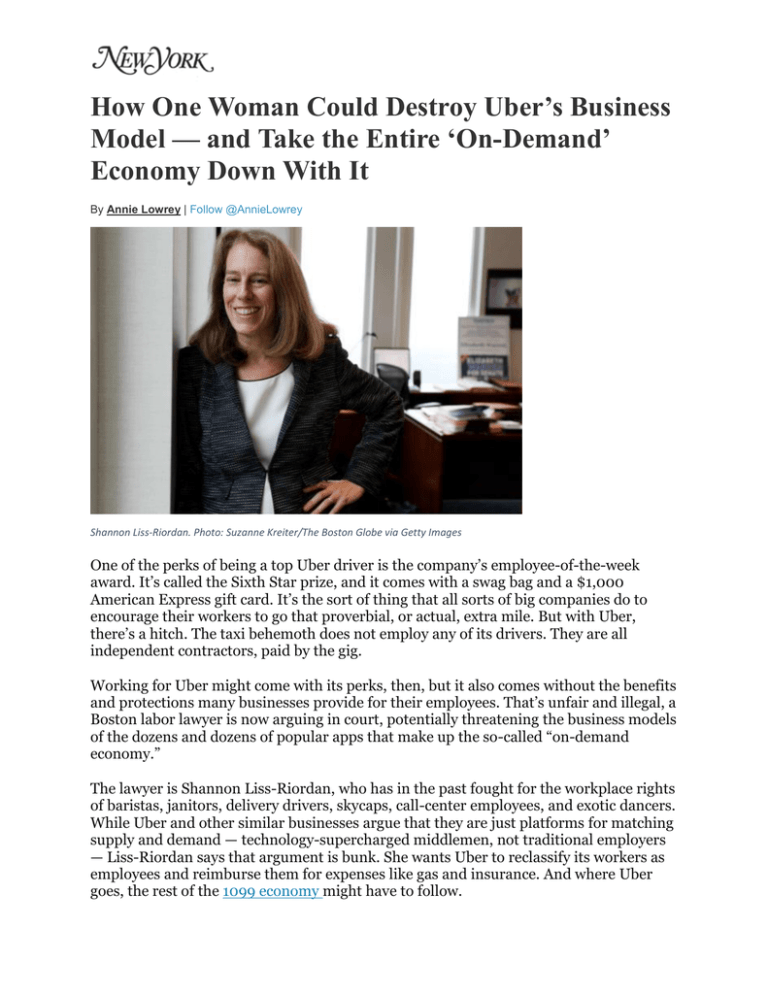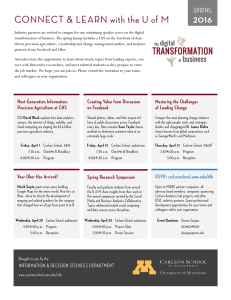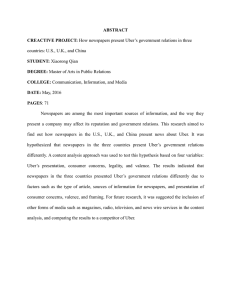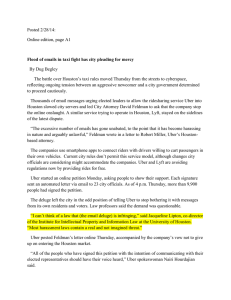How One Woman Could Destroy Uber`s Business Model — and
advertisement

How One Woman Could Destroy Uber’s Business Model — and Take the Entire ‘On-Demand’ Economy Down With It By Annie Lowrey | Follow @AnnieLowrey Shannon Liss-Riordan. Photo: Suzanne Kreiter/The Boston Globe via Getty Images One of the perks of being a top Uber driver is the company’s employee-of-the-week award. It’s called the Sixth Star prize, and it comes with a swag bag and a $1,000 American Express gift card. It’s the sort of thing that all sorts of big companies do to encourage their workers to go that proverbial, or actual, extra mile. But with Uber, there’s a hitch. The taxi behemoth does not employ any of its drivers. They are all independent contractors, paid by the gig. Working for Uber might come with its perks, then, but it also comes without the benefits and protections many businesses provide for their employees. That’s unfair and illegal, a Boston labor lawyer is now arguing in court, potentially threatening the business models of the dozens and dozens of popular apps that make up the so-called “on-demand economy.” The lawyer is Shannon Liss-Riordan, who has in the past fought for the workplace rights of baristas, janitors, delivery drivers, skycaps, call-center employees, and exotic dancers. While Uber and other similar businesses argue that they are just platforms for matching supply and demand — technology-supercharged middlemen, not traditional employers — Liss-Riordan says that argument is bunk. She wants Uber to reclassify its workers as employees and reimburse them for expenses like gas and insurance. And where Uber goes, the rest of the 1099 economy might have to follow. According to Liss-Riordan, the trick Uber and other businesses are trying to pull is an old one: give workers the obligations of full-time employees while misclassifying them as contractors to reduce labor costs and undercut the competition. “They’re trying to have their cake and eat it, too,” Liss-Riordan said of Uber. “I’ve seen so many different businesses do this in so many different industries over the years,” she said, citing FedEx, a cleaning company, a trucking firm, a call center, and a maker of adult films as other offenders. Right now, the legal distinctions between employees and contractors are fine ones. But it all boils down to how much control a business exerts over a given worker. Uber drivers can choose which hours they work and how much they work, both hallmarks of an independent-contracting job. But they are monitored on a real-time basis, Liss-Riordan pointed out. And they “can be terminated at the will of a local manager,” both hallmarks of traditional employment. Since Uber drivers are contractors, they receive few of the perks that employees do. They do not receive unemployment compensation when they are fired or laid off, for instance. They are not offered retirement-account matching, health insurance, or life insurance. They do not get reimbursed for gas or repairs. And they need to pay their own taxes out of their own earnings; there is no withholding. That means that Uber drivers make less than they otherwise would, Liss-Riordan argues. “Uber has advertised to its customers that gratuity is included in the cost of its car service. However, Uber drivers do not receive the total proceeds of any such gratuity,” the suit says, one of many such complaints. It all comes with a serious upside for consumers, by way of cheap rides and delivery fees. And it is a central part of the business model for many of these apps: No employees means low overhead and easy scaling, which means more revenue and more profit. It’s not necessarily a bad deal for drivers, either. “I’m a student,” one driver told me last week, “so I just do it in my off hours. It’s a gig,” not a job, he said. That assessment is backed up by a study of Uber’s drivers, which shows that many use it as a complement to other work. Indeed, a majority of drivers said they partnered with Uber “to have more flexibility in my schedule and balance my work with my life and family,” and "to help maintain a steady income." But according to the participants in the suit, the deal violates labor standards. It also puts Uber's competitors at a disadvantage, since they need to charge higher prices to cover their labor costs. “I’m getting so many calls not just from workers, but from complying competitors, who are outraged,” Liss-Riordan said. “They’re following the rules, and treating their drivers as employees, and paying into unemployment and worker’s comp. And they’re being undercut by companies that are not playing by rules. It creates a race to the bottom.” As a class-action lawyer on workplace issues, Liss-Riordan sees that kind of race to the bottom everywhere, and she has become one of Boston’s most prominent attorneys for fighting it. She sued the iconic Hilltop Steak House, now closed. She sued on behalf of Logan Airport’s skycaps. She also won a case on behalf of all of Starbucks’s Massachusetts baristas, netting them about $15 million, or more than $1,000 per plaintiff. And when not busy suing prominent businesses, she and her husband run a Harvard Square pizza parlor that she had previously litigated against. It used to be called the Upper Crust. It’s now called the Just Crust, and its workers own part of the company. In this lawsuit, the stakes are not just Uber’s business and its huge pile of cash, but the business models and cash piles of dozens of other on-demand businesses. In the past few years, dozens of technology-facilitated middlemen have cropped up — for housecleaning, moving, delivery, and other tasks. And Silicon Valley has showered them with money. Liss-Riordan argues there’s no reason why the businesses could not continue to thrive and profit while employing their employees. “There are so many businesses that play by the rules,” she said. And that’s probably right: Charging higher prices and spending more money on labor costs might not doom an Uber or a Homejoy. But her suit, and others like it, might fundamentally change the calculus used by the venture-capital firms pumping money into these businesses, if they were required to reimburse for expenses or abide by other labor regulations. They might grow more slowly. They might make less money. They might have trouble scaling. Their featherlight business model might become a kludgier, more old-fashioned one. Still, that presumes that the labor regulations in place are the right ones, and that the businesses are complying or they aren’t. The truth seems to be more complicated, a fact that Judge Vince Chhabria underscored when he described the current employment categories as “woefully outdated” while reviewing a case against Lyft. That need not be so. States could create new worker designations to fit this burgeoning industry, which now employs hundreds of thousands of Americans, most in an informal, part-time capacity. The new designations could ensure that workers had the flexibility afforded by contract work, but along with protections against earning less than the minimum wage and compensation for money spent on the job, for instance. In such an arrangement, businesses would benefit from an easily scaled labor force and legal certainty. At the same time, workers would benefit from hyperflexible jobs with better security and higher incomes. Everybody could benefit. But as currently construed, it’s Liss-Riordan versus an industry, and the sole question is who wins.






